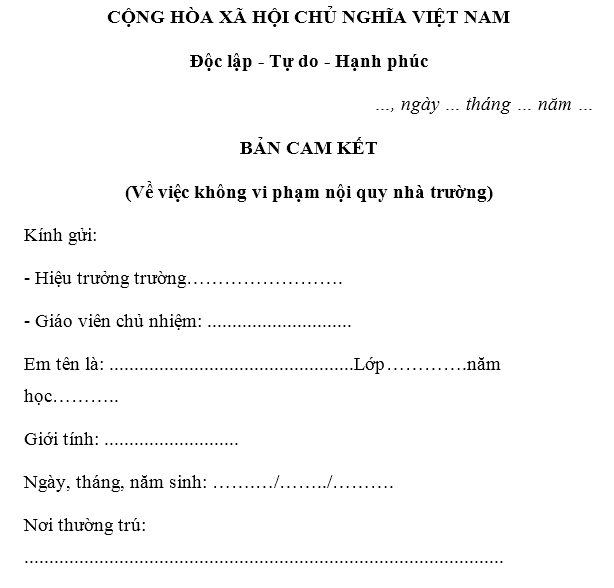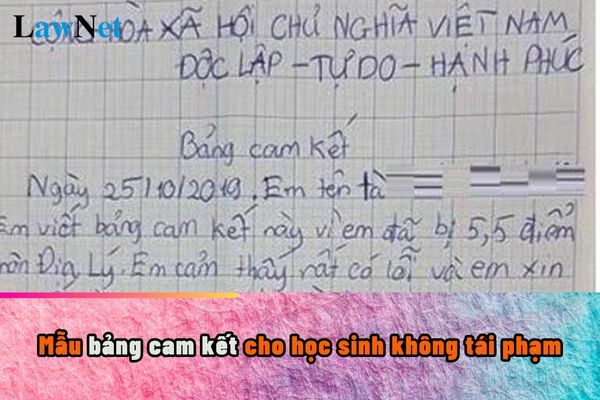What is the sample Commitment Form to not repeat offenses for students in Vietnam? What are 7 prohibited behaviors for secondary school students in Vietnam?
What is the sample Commitment Form to not repeat offenses for students in Vietnam?
Currently, the law does not specify a sample Commitment Form to not repeat offenses for students. A sample Commitment Form to not repeat offenses for students is often used when a student has violated school regulations and commits not to repeat that behavior. This form does not have a fixed format and is usually designed by the schools themselves.
Typically, it will include the following information:
Title: Commitment Form to not repeat offenses for students
Personal information of the student: Full name, class, date of birth, reason for writing the commitment.
Details of the violation: A specific description of the behavior that violated regulations.
Commitment: The student commits not to repeat the behavior and commits to taking actions to remediate the consequences and improve themselves.
Signatures of the student, parent/guardian, and homeroom teacher.
Date the form was created.

Download the latest Commitment Form to not repeat offenses in 2024.
|
Guidance on Writing a Commitment Form to not repeat offenses Personal Information: Fill out the student's personal information accurately and completely. |
This form can be used for various educational levels.
Note: Information is for reference only./.

What is the sample Commitment Form to not repeat offenses for students in Vietnam? What are 7 prohibited behaviors for secondary school students in Vietnam? (Image from Internet)
What are 7 prohibited behaviors for secondary school students in Vietnam?
According to the regulations in Article 37 of the Charter of junior secondary schools, senior secondary schools, and multi-level schools issued in conjunction with Circular 32/2020/TT-BGDDT, the following are prohibited behaviors for secondary school students:
[1] Insulting the dignity, honor, or infringing on the physical person of teachers, staff, school employees, others, and other students.
[2] Cheating in studies, tests, exams, and admissions.
[3] Buying or using alcohol, beer, tobacco, narcotics, other stimulants, fireworks, and explosive substances.
[4] Using mobile phones or other devices during class that are not for study purposes or without teacher permission.
[5] Fighting, causing disorder, or disrupting security in schools and public places.
[6] Using or exchanging cultural products that incite violence or are depraved; using toys or playing games that harm healthy development.
[7] Students are prohibited from engaging in other behaviors prohibited by law and school/class regulations.
What are rights of lower and upper secondary school students in Vietnam?
The rights of lower and upper secondary school students are stipulated in Article 35 of the Charter issued in conjunction with Circular 32/2020/TT-BGDDT:
- To be equal in enjoying comprehensive education, assured conditions such as time, facilities, hygiene, and safety for studying in class and self-study at home; to be provided with information regarding their study and training; to use equipment and media for learning, cultural, and sports activities as per school regulations.
- To be respected and protected, to be treated equally and democratically, to have the right to appeal to schools and educational management levels regarding decisions affecting them; to transfer schools for legitimate reasons as per current regulations; to study ahead of age, skip grades, or learn at older ages than stipulated by Article 33 of the Charter issued in conjunction with Circular 32/2020/TT-BGDDT.
- To participate in activities to develop talents in subjects, sports, arts organized by the school if conditions are met.
- To receive scholarships or other allowances as per policies for socially disadvantaged students, students with difficulties in life, and students with special abilities.
- To transfer schools if qualified under regulations; school transfer procedures are implemented per the regulations of the Minister of Education and Training.
- To enjoy other rights as provided by law.

